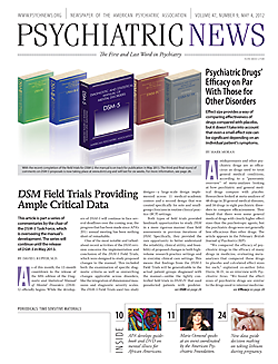Now that several genes have been linked to schizophrenia, and that disorder has been linked to various brain abnormalities, could the genes and the abnormalities be related?
The evidence for that hypothesis is strong, at least for one of the more robust schizophrenia gene candidates— Dysbindin—a team of German scientists reported in the April NeuroImage. The lead researcher was Thomas Nickl-Jockschat, M.D., director of the Clinic for Psychiatry, Psychotherapy, and Psychosomatics at the University of Aachen.
The study was based on 83 mentally healthy young subjects who were genotyped to see if they possessed either the C variant or the T variant of the Dysbindin gene. Forty-six were found to have two copies of the C variant, and 37 were found to have at least one copy of the T variant. An MRI-based imaging technique was used to evaluate white-matter structures in their brains. The scientists found that subjects who had the T variant of the Dysbindin gene—a variant linked to schizophrenia in previous studies—had white-matter abnormalities in the hippocampal region of the temporal lobe.
Temporal-lobe abnormalities have been associated with core symptoms of schizophrenia, such as hallucinations and thought disorder. Thus it’s possible that if the T variant of the Dysbindin gene contributes to schizophrenia, it might do so by altering white matter in the hippocampal region of the temporal lobe, “although the molecular environment might be different in schizophrenia patients since we think of schizophrenia as a polygenic disorder,” Nickl-Jockschat told Psychiatric News.
The T variant subjects were also found to possess abnormal white-fiber tracts in the frontal lobe, and reductions in frontal-lobe white matter have often been observed in people with schizophrenia.
While the white-fiber abnormalities discovered in the T variant subjects were modest, it may be because the researchers examined healthy young subjects with a high level of intellectual functioning and without a history of psychiatric disorder in their first-degree relatives, they reasoned. Yet whether more pronounced white-matter abnormalities are present in individuals with schizophrenia or in their first-degree relatives remains to be determined, Nickl-Jockschat said.
Interestingly, several mutations in the Dysbindin gene can cause X-linked muscular dystrophy, and neuropsychological abnormalities found in individuals with muscular dystrophy—essentially working-memory deficits—can also be found in individuals with schizophrenia.
The study was funded by the International Research Training Group and RWTH Aachen University.

